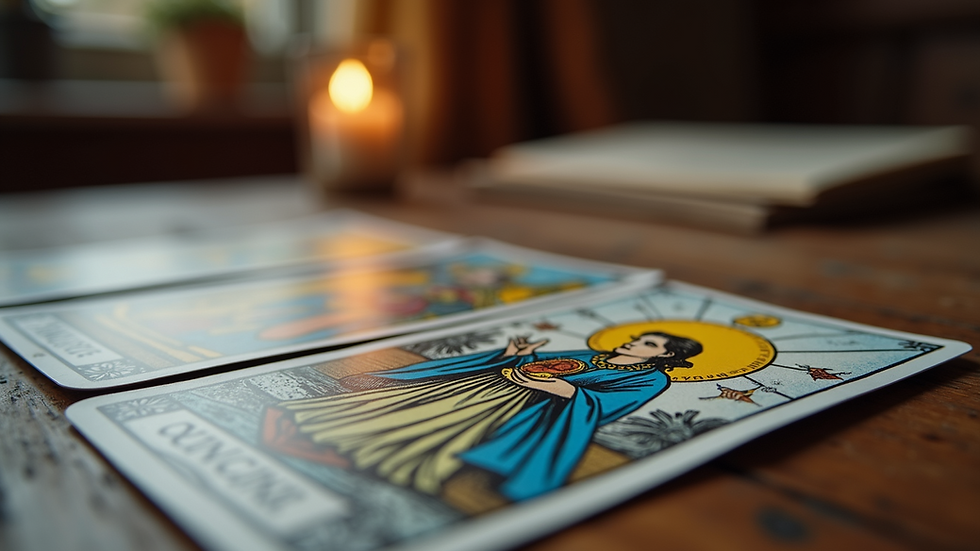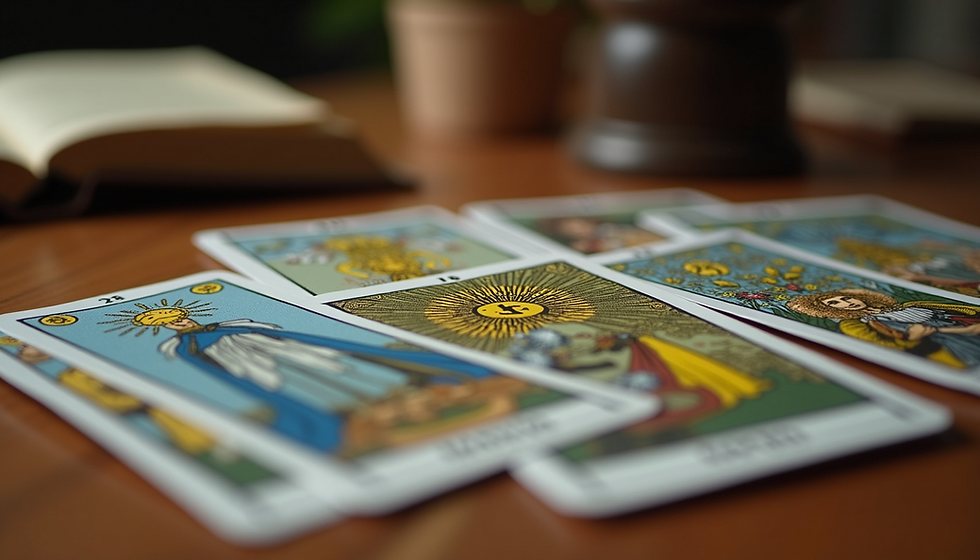Discover Tarot Card Meanings: Your Guide to Readings
- falojesus
- Sep 24, 2025
- 4 min read
Updated: Sep 26, 2025
Tarot cards have fascinated people for centuries. They are not just a tool for fortune-telling; they are a way to explore your inner self and gain insights into your life. Whether you are a beginner or have some experience, understanding the meanings of tarot cards can enhance your readings. In this guide, we will explore the basics of tarot, the meanings of the cards, and how to conduct your readings.
What is Tarot?
Tarot is a deck of 78 cards, each with its own imagery, symbolism, and story. The deck is divided into two main parts: the Major Arcana and the Minor Arcana.
Major Arcana: This consists of 22 cards that represent significant life events and spiritual lessons. Cards like The Fool, The Lovers, and The World fall into this category.
Minor Arcana: This consists of 56 cards divided into four suits: Cups, Pentacles, Swords, and Wands. Each suit represents different aspects of life, such as emotions, material matters, thoughts, and actions.
Understanding these two categories is essential for interpreting the cards effectively.
The Major Arcana: Key Cards and Their Meanings
The Major Arcana cards are often seen as the heart of the tarot deck. Each card tells a story and carries deep meanings. Here are a few key cards and their interpretations:
The Fool
Meaning: New beginnings, adventure, and spontaneity. The Fool encourages you to take risks and embrace the unknown.
The Lovers
Meaning: Relationships, choices, and harmony. This card often signifies a deep connection with someone or a significant decision that needs to be made.
The World
Meaning: Completion, fulfillment, and achievement. The World indicates that you have reached a significant milestone in your life.
These cards can provide profound insights into your journey and help you understand the larger themes at play.
The Minor Arcana: Understanding the Suits
The Minor Arcana is divided into four suits, each representing different aspects of life. Here’s a brief overview of each suit:
Cups
Focus: Emotions and relationships. Cups deal with feelings, love, and connections with others.
Pentacles
Focus: Material aspects and finances. Pentacles relate to work, money, and physical health.
Swords
Focus: Thoughts and challenges. Swords represent conflict, decisions, and mental clarity.
Wands
Focus: Creativity and action. Wands are about inspiration, ambition, and personal growth.
Understanding the suits helps you interpret the cards in context.
How to Read Tarot Cards
Reading tarot cards can be a personal and intuitive experience. Here are some steps to help you get started:
1. Set Your Intention
Before you begin, take a moment to focus on what you want to learn from the reading. This could be a specific question or a general inquiry about your life.
2. Shuffle the Cards
As you shuffle, think about your intention. This process helps to connect your energy with the cards.
3. Choose Your Spread
A tarot spread is the layout of the cards. Common spreads include:
Three-Card Spread: Past, present, future.
Celtic Cross: A more complex spread that provides a detailed overview.
4. Interpret the Cards
Look at each card and consider its meaning. Pay attention to how the cards relate to each other.
5. Trust Your Intuition
While the meanings of the cards are important, your intuition plays a crucial role. Trust your feelings and insights as you interpret the cards.
Tips for Effective Tarot Readings
To enhance your tarot reading experience, consider these tips:
Keep a Journal: Write down your readings and interpretations. This helps track your progress and insights over time.
Practice Regularly: The more you read, the more comfortable you will become with the cards.
Stay Open-Minded: Tarot is not about predicting the future with certainty. It is a tool for reflection and guidance.
Create a Calm Environment: Find a quiet space where you can focus without distractions.
Common Misconceptions About Tarot
Many people have misconceptions about tarot. Here are a few to clarify:
Tarot is Only for Fortune-Telling
While tarot can provide insights into the future, it is more about self-reflection and understanding your current situation.
You Need to Be Psychic
You do not need to have psychic abilities to read tarot. Anyone can learn to interpret the cards with practice and patience.
Tarot is Evil or Cursed
Tarot is a tool, and its meaning depends on how you use it. Many people find it to be a positive and enlightening experience.
Exploring Tarot Card Combinations
Sometimes, the meaning of a card can change based on the cards around it. Here are a few examples of combinations:
The Lovers + The Fool
This combination may suggest a new romantic adventure or a fresh start in a relationship.
The Tower + The Swords
This pairing could indicate a sudden upheaval or a challenging decision that needs to be made.
The Empress + The Pentacles
This combination may signify abundance and nurturing in your material life, such as a successful business venture.
Understanding these combinations can deepen your readings and provide more nuanced insights.
The Role of Intuition in Tarot
Intuition is a vital part of tarot reading. While the meanings of the cards provide a foundation, your personal insights can lead to more meaningful interpretations. Here are some ways to enhance your intuition:
Meditate: Spend time in quiet reflection to connect with your inner self.
Listen to Your Gut: Pay attention to your feelings and instincts during a reading.
Practice Visualization: Imagine the scenarios represented by the cards to gain deeper insights.
Tarot for Personal Growth
Many people use tarot as a tool for personal development. Here are some ways it can help:
Self-Reflection: Tarot encourages you to look inward and examine your thoughts and feelings.
Decision-Making: The cards can provide clarity when faced with difficult choices.
Goal Setting: Tarot can help you identify your aspirations and the steps needed to achieve them.
Final Thoughts on Your Tarot Journey
Embarking on a tarot journey can be both exciting and enlightening. As you explore the meanings of the cards, remember that the most important aspect is your connection to them.
Whether you are seeking guidance, clarity, or simply a deeper understanding of yourself, tarot can be a valuable tool. Embrace the process, trust your intuition, and enjoy the journey of discovery.

As you continue to learn and grow, may your tarot readings bring you insight and inspiration. Happy reading!

Comments